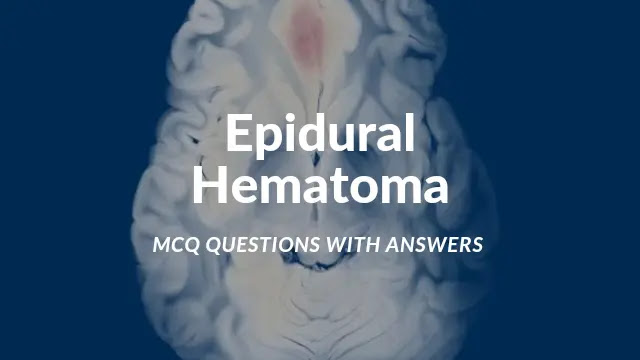Treatment Of Epidural Hematoma MCQs With Answers
A 35-year-old man was involved in a motor vehicle accident and hit his head on the windshield. He lost consciousness for a brief period and then regained consciousness. However, he started experiencing a severe headache and began to feel drowsy. Upon examination, a hematoma is suspected. What is the immediate management for this patient?
A) Administer intravenous fluids and observe the patient
B) Start anticoagulant therapy
C) Administer pain medications and discharge the patient
D) Perform an emergency craniotomy for hematoma evacuation
Answer: D) Perform an emergency craniotomy for hematoma evacuation
Explanation: In this scenario, the patient has experienced head trauma, loss of consciousness, severe headache, and drowsiness, which are indicative of an epidural hematoma. Immediate surgical intervention, such as an emergency craniotomy, is necessary to evacuate the hematoma and relieve the pressure on the brain.
A 28-year-old woman fell from a ladder while painting her house. She hit the back of her head and immediately lost consciousness. She was brought to the emergency department. On examination, she is unconscious with a dilated pupil on the same side as the injury. What is the most appropriate management for this patient?
A) Administer oxygen and monitor vital signs
B) Perform a head CT scan to confirm the diagnosis
C) Administer mannitol to reduce brain swelling
D) Perform an immediate craniotomy for hematoma evacuation
Answer: D) Perform an immediate craniotomy for hematoma evacuation
Explanation: In this scenario, the patient has a severe head injury with loss of consciousness and a dilated pupil, indicating a large epidural hematoma causing increased intracranial pressure. Immediate surgical intervention, such as an immediate craniotomy, is necessary to evacuate the hematoma and relieve the pressure on the brain.
A 45-year-old man slipped and fell on ice, hitting the side of his head against the pavement. He briefly lost consciousness but regained it within a few minutes. He is alert and oriented but complains of a persistent headache. On examination, there are no focal neurological deficits. What is the appropriate management for this patient?
A) Observe the patient closely for 24 hours
B) Administer pain medications and discharge the patient
C) Perform a head CT scan to rule out epidural hematoma
D) Admit the patient for observation and serial neurological examinations
Answer: C) Perform a head CT scan to rule out epidural hematoma
Explanation: In this scenario, the patient has a head injury with a brief loss of consciousness and persistent headache. Although there are no focal neurological deficits, there is a risk of an epidural hematoma. A head CT scan should be performed to rule out the presence of a hematoma. If a hematoma is confirmed, surgical intervention may be required depending on its size and location.

Comments
Post a Comment